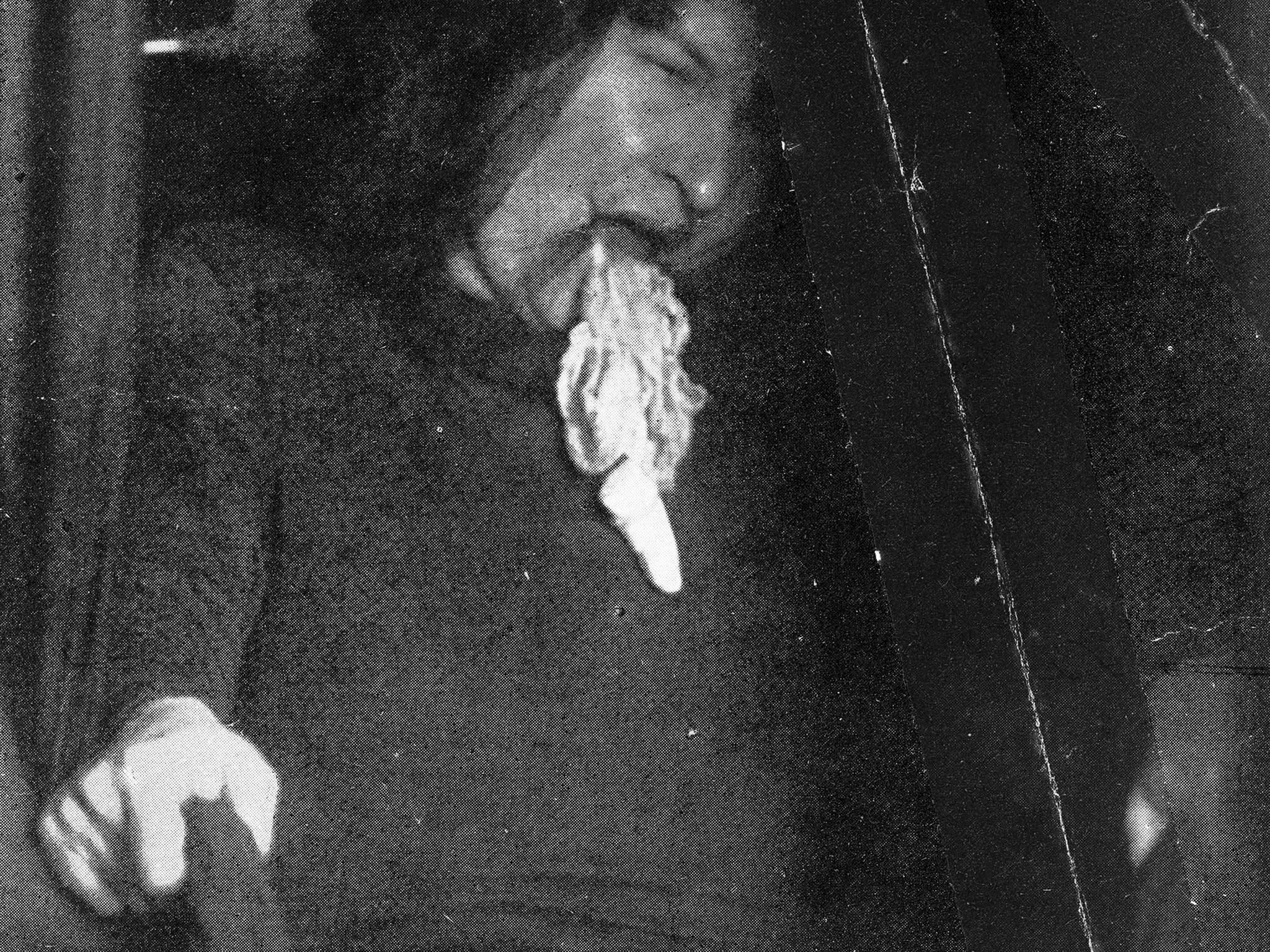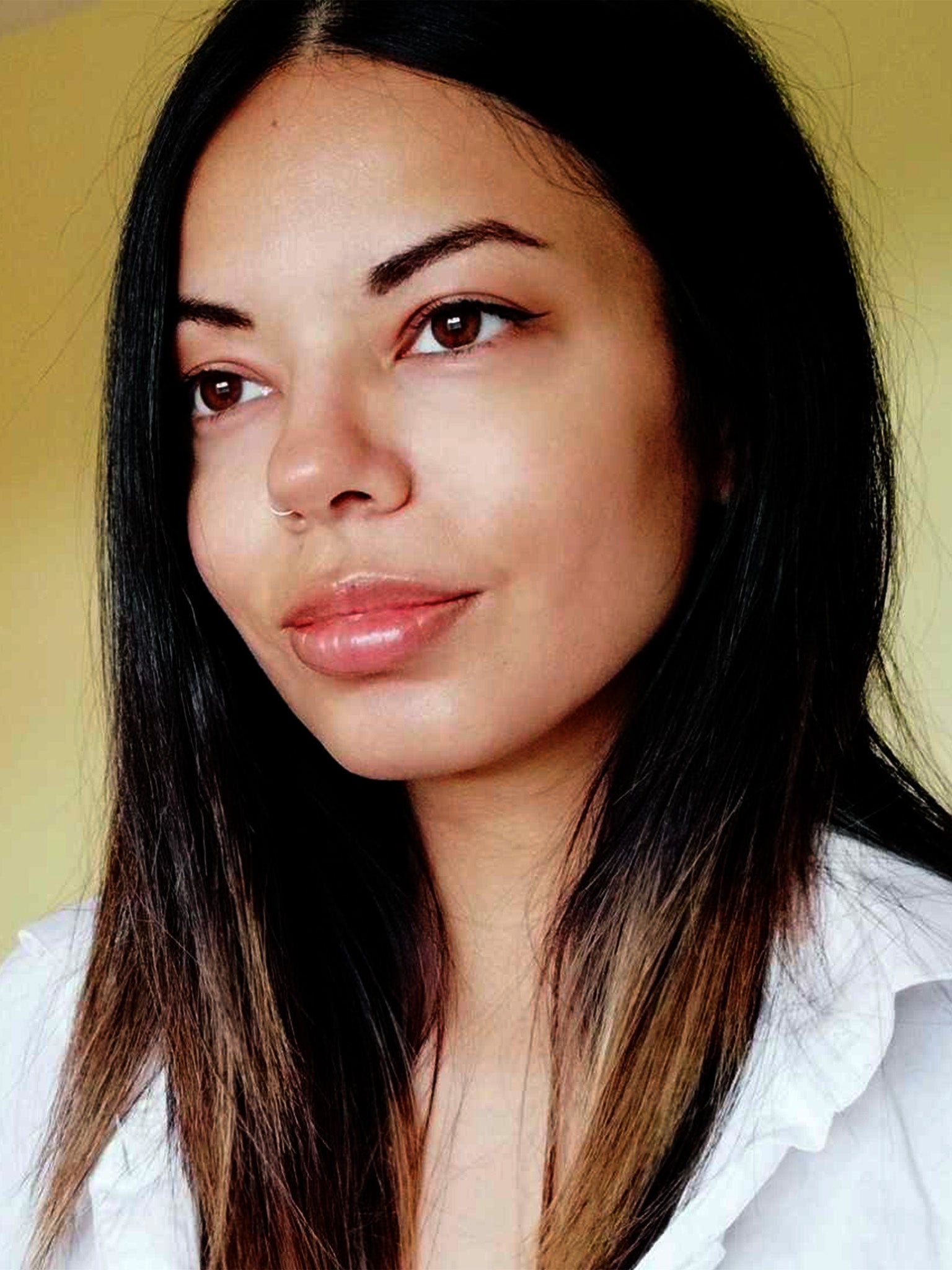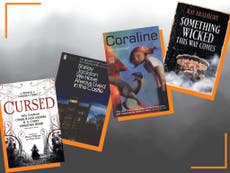Do you believe in ghosts? ‘I thought it was normal to see people that weren’t there’
It’s the season of phantoms and apparitions, when the barriers between this world and the next are at their thinnest. But why, asks David Barnett, do we really believe in ghosts?


Nina Gill sees dead people. It started when she was four years old and living in Pakistan. A neighbour had died in childbirth and Gill’s mother was looking after the premature baby while she grew strong enough to go back to the father.
Gill hadn’t been told the baby’s mother had died, and kept seeing the woman around the house. She recalls: “My mum was spooked but very open-minded as she had also seen the baby’s mother a couple of times, usually by her in the mirror. After the baby was strong enough she was given back to her father and siblings and I didn’t see the baby’s mum again, that’s when mum explained to me that she had passed away.”
That was the first paranormal experience that Gill, who is now 30 and living in Worcestershire with her husband Samuel, can remember. But it certainly wasn't going to be the last. The youngest of four girls, she moved with her family to England in 1996, when she was six, to help care for her grandmother.
“I thought it was normal to see people that weren’t there and interact with them,” she says. “When we came to England we moved into an old four-storey Victorian house and I used to play with a girl in a ‘funny dress’ in the cellar. I told my mum about her and she eventually showed me some pictures of what Victorian children wore as that was what I was describing and I was like, ‘Yeah that’s what she wears’.”
Gill’s grandmother was very spiritual herself, and as a child Gill would tell her about the experiences she had with ghosts. Her grandmother passed away nine years ago, and prior to that they had talked about what would happen when she had gone, and how Gill would “like her to visit me”.
She says: “I had a dream about her a few weeks after where we were talking and interacting like she was alive. I asked her ‘Are you OK? Are you happy?’ She was very ill before her passing but looked well. She responded by saying ‘I’ll give you a sign that I’m OK in the red poppies’. My mum and I drove past some fields near the house most weekends, and a few days later the fields were red with poppies and I burst out crying, explaining my dream to mum. My mum then shared that red poppies were her dad’s favourite flowers. I never got to meet my grandad as he passed away well before I was born.”
She was very ill before her passing but looked well. She responded by saying, ‘I’ll give you a sign that I’m OK in the red poppies’
Not all the paranormal experiences Gill — who has a baby on the way herself — has had have been so benign, though. When she was 24, following the break-up of a relationship and with no job prospects, she moved into an old Victorian rented house where she immediately began to feel uneasy, and as though she was being watched. Lights would switch on and off, and her cat, Baileys, would hiss at empty corners. “I believe negative entities can feed from people when they are particularly low,” says Gill. And things only got worse when she met her husband-to-be Samuel and moved him in.
They got a dog, a Spaniel called Boston, and one time after shutting him in the dining room the door opened of its own accord and a man’s voice said: “Come on, then,” to the dog. Alone in bed while Samuel was downstairs, Gill saw a tall figure wearing a top hat by the open door of her room. And a strange symbol, a circle with a star in the middle, was drawn on a dusty mirror.
Samuel, previously a sceptic, soon became a believer.

Gill says: “I broke down as the house had a dark feeling to it and I had had enough with all these things happening. We were saving for a wedding but decided to accept help from family and move out to a house of our own. We had just had enough! I spoke to the previous owner who then told me she knew there was something in the house, and we came to the conclusion it didn’t like men for whatever reason.”
Gill is extremely matter-of-fact about her experiences. She is open about talking about them, but has nothing to gain from doing so. But then, as she says, it’s difficult not to believe in ghosts when you’ve had a lifetime of it. I completely get why people do not believe, as it’s hard to believe something you have not experienced or can not understand,” she says. “I’d probably think I was crazy too with some of the things I have experienced!”
But what has she experienced, really? What is this paranormal activity, exactly? What do we mean by ghosts? The souls of the dead, not moving on to whatever afterlife awaits them, for whatever reason? Echoes of lives lived in those houses, like scratchy video recordings? The product of an over-active imagination?
That’s a question that Dr Callum E Cooper tries to answer for a living. A senior lecturer in psychology at the University of Northampton, much of his work is concerned with the branch of his discipline that attempts to make some kind of sense of reports of the supernatural — parapsychology.
So, Cooper. You're a scientist. There must be a rational explanation for what Gill says she has experienced, right? And that’s the first mistake; even approaching paranormal phenomena from a sceptic’s stance, Cooper does not like the idea of people such as Gill being branded “irrational”.
“I tend to prefer the word conventional to rational,” he says. “Take what are pretty day-to-day experiences that people have such as knowing who’s calling before the phone rings, or feeling like you’re being stared at and turning around to see someone looking at you. There have been surveys where something like 70 per cent of people experience these things, those that don’t are in the minority.
“So it’s not irrational that they’re having these kind of experiences. They’re extremely common. So we want to use words such as conventional because although these things don’t fit into conventional paradigms they are still very common, so We were saving for a wedding but decided to accept help from family and move out to a house of our own. We had just had enough!It’s certainly not irrational to believe you’ve experienced this, it is in fact very rational, but it’s just not conventional.”
It’s certainly not irrational to believe you’ve experienced this, it is in fact very rational, but it’s just not conventional
There is a big leap, though, from guessing your mum is going to call five minutes before the phone rings to seeing a dark figure in a top hat crouching in your bedroom doorway. So what is a ghost, then?
“It depends what you mean by ghost,” says Cooper, with the well-practised response of someone who has been asked this many times before. And the question “what is a ghost”, or at least, what is happening with people who say they have seen them, is the one his research and that of many other parapsychologists – Cooper is a member of the Society for Psychical Research, which was founded in 1882 – sets out to answer.
His particular focus at the moment is centred on paranormal experiences as related to bereavement. His work – and that of others – has shown that some 50-60 per cent of people who have lost a loved one then have some kind of experience that we might term paranormal.
Cooper says: “I have been looking at emotions such as hope, which is a very powerful cognitive mechanism for us. When we are feeling at our lowest that helps us drive forward and look for a way through, shows us how we can set our sights on something and work towards that.
I have been looking at emotions such as hope, which is a very powerful cognitive mechanism for us and helps us drive forward and look for a way through
“So these experiences suggested something more was going on to these individuals and allowed them to kind of move forward with a mindset of, ‘Well they're still watching over me in some way’. Or, ‘They’re still around so I can move forward, I can keep setting goals, I can keep socialising, I’ve just got to re-establish my day to do life without them in it’. And that has often sped things up in terms of coping and recovery.”
So ghosts are all in the mind, then? Cooper’s bereavement experience theory certainly fits in with what happened to Gill in the aftermath of her grandmother’s death, but not what happened to her before or after.
The short answer is, parapsychology doesn’t have all the answers – as is the case with any other science – and is still trying. But employing scientific methods on something like the paranormal effectively means you start out from a position of non-belief.
Take an incident where, say, a cup falls from a table that nobody is near. To see that, some people might immediately say that a poltergeist is at work. What other explanation is there? Well, that’s what parapsychologists have to discover. And to do that they employ the theory of Occam’s Razor — the best explanation for any occurrence is usually the one that takes the smallest number of steps to get to.
So, with our hypothetical cup, from a scientific point of view more likely explanations could be that a cat sitting on a chair under the table swiped it off, or the table was on a sloping floor, or a vibrating washing machine in the kitchen caused it to judder to the edge. There are countless more theories that need to be disproved before any scientist will get even close to the idea that the spirit of a dead person did it.
“I think a scientist of any field needs to be sceptical,” says Cooper. “You need to be very critical and questioning of whatever it is you're looking into. Whenever you design an experiment and you're looking at something you’re essentially trying to disprove what it is you're looking for by putting barriers in place that could stop fraud, sensory leakage – to try to control whatever it is you’re exploring. If the anomaly still shows, then that’s worthy of further attention.”
Which isn't to say that a scientist’s necessary scepticism is the same as being an all-out debunker, such as James Randi, who died this month. There was certainly a feeling in the last century that anyone who professed to have had a paranormal experience must be uneducated or even feeble-minded.
One of Cooper’s predecessors in the field, Dr Walter Franklin Prince, who served as the president of the Society for Psychical Research in the 1930s, wrote a book called Noted Witnesses For Psychic Occurrences in 1928, as a response to this very view.
I started to believe when I and three other witnesses saw a pair of disembodied legs walking
Cooper says: “He just thought this is a really ridiculous argument so he went out and he interviewed and collected cases from police officers, judges, lawyers, medical doctors and nurses… You name it, he got all these kinds of the prestigious people within society to say, look you can be as well educated as you like, everyone on any end of the scale is having these experiences.”
Although he's looking at the idea of bereavement as being a trigger for paranormal experiences, Cooper fully accepts that this doesn’t explain everything that people say they have felt or seen.
“What about when there are multiple witnesses to an incident, and they’re not involved in your own grief?” he says. “What if the gas man comes around and he's read the meter and he sees the apparition, too? So what's going on there? There is one study that looks at only funeral directors and their apprentices, and was postulated that they have no emotional attachment to the dead people they deal with, and yet they report seeing apparitions.”
Parapsychology doesn’t have all the answers, but it’s trying its best to ask the right questions. Cooper has been involved in countless investigations at purportedly haunted properties. It’s not, he says, like the TV show Most Haunted – more of which a little later – with lots of running around in the dark and night-vision cameras. It’s more him sitting in a room with CCTV and a notepad. So far he hasn’t experienced anything that Occam’s Razor would direct him to the ineffable conclusion that it was a ghost what done it. But that isn’t necessarily to say things might not be different in 10 or 20 or 50 years’ time.
“When the Society for Psychical Research began it was looking at things such as mesmerism and hypnotism, and that’s not part of our remit any more,” he says. “Now we’re aware of suggestibility and the impact it has on people. The same with dreams. We still don’t fully understand why people dream, and also why they can have precognitive dreams, but that has now worked its way out of parapsychology and into the psychology.”
So science could eventually prove the existence of ghosts?
“Prove is a really strong word that science doesn’t tend to use,” says Cooper. “It’s more a case of finding evidence to suggest something is or isn’t likely to be the case.”
We’ve believed in ghosts and paranormal activity for a long time now, probably as long as we’ve been on the planet. But it’s really thanks to the Victorians that we do so to the depth that we do. Emily Vincent is a PhD researcher at the University of Birmingham who is working on the 19th-century ghost stories of women writers and how they intersect with the explosion in the interest in spiritualism at that time.
The proliferation of spiritualist books and newspapers, the accessibility of mediums, and the immense popularity of ghost stories meant that the Victorians did not have to look far to encounter a spectre
She says: “Belief in the ghostly surged during the mid-19th century largely due to the emergence of a new religious movement, spiritualism, in which mediums communicated with the dead at the request of the living, often during a sitting or séance. The movement was hugely popular with the middle- classes and captivated many notable Victorians, from author Elizabeth Barrett-Browning to Queen Victoria, who was rumoured to host séances. As séances gradually relocated from public performances to the domestic sphere, the supernatural became accessible from the comfort of the Victorian home.”
Literary celebrities, says Vincent, including Sherlock Holmes author Sir Arthur Conan Doyle, ardently defended their passion for spiritualism and helped to popularise beliefs in the supernatural. Doyle published a collection of essays concerning his experiences of séances, The History of Spiritualism, and frequently wrote on his enthusiastic belief in ghost-photography. She says: “The proliferation of spiritualist books and newspapers, the accessibility of mediums, and the immense popularity of ghost stories, such as Dickens’ A Christmas Carol, meant that the Victorians did not have to look far to encounter a spectre.”
The Victorian era was one of great and industrial advance, perhaps mirroring our own very technological era. So why, at times of great scientific progress, does belief in the supernatural not only still survive, but proliferate?
“As in the 19th century, a modern-day belief in the supernatural is an amplification of the strange – and often unnerving – experiences of the everyday,” suggests Vincent. “Today, we can see ghosts, with their disregard for spatial and temporal boundaries, as a reflection of the uncanny digital technologies that haunt our daily routines.
"We can use an iPhone or Zoom to miraculously interact with disembodied voices located far away, often in other time zones, in the same way that the Victorians purportedly used séance technologies (the Planchette, or Ouija board) to communicate with voices far removed from their sitting rooms. Communication is at the heart of supernatural belief and as our 21st century obsession with digital interaction persists, so too does the desire to push the boundaries of communication, perhaps into another world.
“There was also a fascinating trend of ‘psychical research’ in the late Victorian era which saw highly rational scientists attempt to prove supernatural phenomena through empirical investigations of ghostly happenings. Viewing the paranormal through a scientific lens, they termed ghosts ‘phantasms of the living’ and haunted houses ‘phantasmogenetic centres’. Today, this may sound more like an episode of a Most Haunted, but it shows that even the most rational of people can enjoy theorising other-worldly beliefs.”
When Karl and I came up with the idea for a TV show where we hunt for ghosts I was intrigued but scared to death at the same time
Ah, Most Haunted again. Mentioned by both Vincent and Cooper, the show premiered in 2002 and brought ghost hunting to the TV screens of millions. Developed by former Blue Peter presenter Yvette Fielding and her husband, Karl Beattie, it ran for 23 seasons and featured a team of paranormal investigators, including the medium Derek Acorah, spending fraught nights in the most notorious, spook-infested houses in this country and abroad.
“Yes, I believe in ghosts,” says Fielding. “I was always a little frightened and yet curious of the paranormal. I wouldn’t really enjoy horror movies at all. I would go home and put all the lights on shaking and sweating under the duvet.
“So when Karl and I came up with the idea for a TV show where we hunt for ghosts I was intrigued but scared to death at the same time.”
But it was one particular incident that convinced her of the existence of the paranormal. She says: “I started to believe when I and three other witnesses saw a pair of disembodied legs walking up the main staircase at the Theatre Royal, Drury Lane, London.
“We all were frozen to the spot and gripped with fear. After the strange apparition faded we legged it!
“Twenty years on and thousands of paranormal investigations later, I can now say in my opinion that there are different types of hauntings and many reasons as to why we see ghosts.”
Most Haunted uses the night vision cameras and cold-spot sensors that Cooper eschews to try to “prove” the existence of ghosts. Over two decades the show never did so conclusively, but Yvette challenges anyone to discount her experiences.
“I have witnessed so many things that cannot be explained,” she says. “The most bizarre is when your fellow investigators are physically harmed. Watching as scratches appear on the skin or burn marks that scar is very traumatic and at times I’ve asked myself...'what the hell are you doing?’
“After such negative experiences it has taken me a while to sleep well at night. Sometimes I will go to the church and get blessed.”
For Fielding, the scientific paraphernalia isn’t the most important part of Most Haunted, which continues today as the Most Haunted Experience, where the public can pay to join the crew on their investigations. She says: “I love to find new ways to investigate the paranormal. Many people love to use lots of gadgets but I prefer my senses. But I do love capturing EVP (electronic voice phenomena). For me that’s the most exciting piece of equipment that we use.
“I do want scientists to take the paranormal more seriously. There is a lot of audio phenomena that I have caught that defies belief. We need scientists to listen to the footage and even join us on investigations. That to me is really important. Also by setting up Most Haunted Experience around the country and in the US people can join me and the team and see that it’s not just a TV show but it’s real and the phenomena is real.”
Belief in ghosts is a curious thing in an age when we can see the smallest molecule and the farthest planet, and are pushing the bounds of science at an ever-increasing rate. Those who dismiss the notion say that they can never accept it without proof. But even the branch of science that is devoted to the study of the paranormal says that proof is a tough ask when dealing with something so ethereal and hard, even impossible, to pin down.
“Personally, I don’t believe in ghosts,” says Vincent. “But my research into Victorian supernatural phenomena and 19th-century spiritualism has allowed me to empathise deeply with those that did believe in ghosts, both historically and today. For me, the wealth of benevolent intentions behind belief in the ghostly far outweighs its sinister connotations. Believers in the supernatural are often driven by a desire to elide the gap between the living and dead, to feel connected to lost loved ones, and to find existential comfort in a suggestion of post-mortem survival.”
"I think it’s wrong for cynical people to mock or dismiss people’s ghostly experiences,” says Fielding. “Seeing is believing and until they experience something for themselves they shouldn’t be too quick to doubt.
“I didn’t believe in an afterlife before I began my adventures on Most Haunted. I thought when you’re dead you’re dead and that’s it, just dust under the ground. I was always a happy person but there was always a nagging fear about death. Now that I have seen countless apparitions and heard their voices I know that without doubt we all go on somewhere else and this knowledge has changed my life for the better. Einstein said that energy does not die. We do not die, our consciousness carries on living. Personally I can’t wait for the journey, but not just yet.”
And what of Nina Gill, who sees dead people, and has done for more than a quarter of a century? No science can yet explain what she has experienced, but she doesn’t mind that. She knows what she has seen and heard, and has a message for those who dispute her.
“I would say that is your choice to not believe and I respect that, but when you experience something that cannot be explained away it changes you,” says Gill. “I do believe there is so much more to this life and this planet than what meets our eye, and if we open ourselves up to it we can gain experiences both good and bad.”




Join our commenting forum
Join thought-provoking conversations, follow other Independent readers and see their replies
Comments